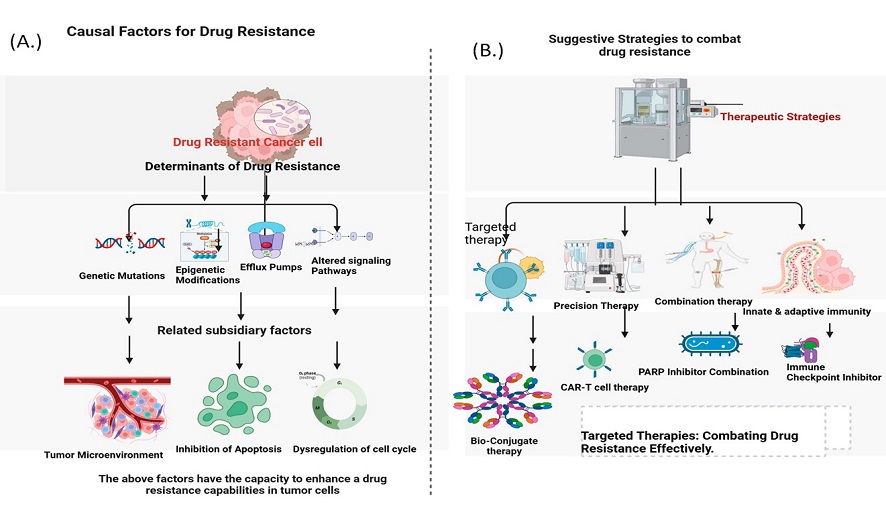Nikhil Prasad Fact checked by:Thailand Medical News Team Jul 09, 2024 9 months, 2 weeks, 3 days, 2 hours, 17 minutes ago
Cancer News: Cancer treatment is constantly evolving, with researchers tirelessly working to outsmart one of its greatest challenges: drug resistance. When cancer cells become resistant to treatments, it becomes harder to control their growth, leading to more aggressive and difficult-to-treat tumors. This
Cancer News report explores groundbreaking research aimed at overcoming drug resistance in cancer cells, bringing hope for more effective treatments and improved patient outcomes.
 Visual overview: understanding drug resistance mechanisms and innovative strategies for overcoming them. Panel (A) details the primary causal determinants contributing to drug resistance, including gene mutations, efflux pumps, alterations in signaling pathways, and tumor heterogeneity. Panel (B) showcases a diverse array of advanced therapy modalities aimed at overcoming the detrimental effects of drug resistance in cancer cells, encompassing targeted therapies, immunotherapies, combination treatments, and emerging molecular interventions.
The Challenge of Drug Resistance
Visual overview: understanding drug resistance mechanisms and innovative strategies for overcoming them. Panel (A) details the primary causal determinants contributing to drug resistance, including gene mutations, efflux pumps, alterations in signaling pathways, and tumor heterogeneity. Panel (B) showcases a diverse array of advanced therapy modalities aimed at overcoming the detrimental effects of drug resistance in cancer cells, encompassing targeted therapies, immunotherapies, combination treatments, and emerging molecular interventions.
The Challenge of Drug Resistance
Drug resistance occurs when cancer cells change in ways that protect them from being destroyed by treatments. This is a major hurdle in modern oncology. Researchers from GLA University in India and the Beckman Research Institute of City of Hope in the USA are investigating new ways to overcome this problem. Their review study dives into innovative strategies and potential solutions.
How Cancer Cells Evade Treatment
Cancer cells develop drug resistance through several mechanisms:
-Genetic Mutations: Cancer cells can mutate, altering the targets of drugs, making them ineffective.
-Efflux Pumps: These are proteins that pump the drugs out of the cells, reducing their effectiveness.
-Altered Signaling Pathways: Cancer cells can change their internal signaling pathways to survive drug treatment.
-Tumor Microenvironment: The environment around the tumor, including low oxygen areas, can protect cancer cells from drugs.
Innovative Strategies to Overcome Drug Resistance
Targeted Therapies
Targeted therapies are designed to attack specific molecules involved in cancer growth. Unlike traditional chemotherapy, which affects both healthy and cancerous cells, targeted therapies focus on the unique characteristics of cancer cells.
-Tyrosine Kinase Inhibitors (TKIs): These drugs block enzymes that promote cancer cell growth. Examples include imatinib (Gleevec) for chronic myeloid leukemia and erlotinib (Tarceva) for non-small cell lung cancer.
-P
ARP Inhibitors: These block enzymes involved in DNA repair, making cancer cells more vulnerable to treatment. Drugs like olaparib (Lynparza) are used for BRCA-mutated cancers.
Immunotherapies
Immunotherapies harness the body’s immune system to fight cancer.
-Checkpoint Inhibitors: Drugs like pembrolizumab (Keytruda) and nivolumab (Opdivo) release the brakes on the immune system, allowing it to attack cancer cells more effectively.
-CAR-T Cell Therapy: This involves modifying a patient's T-cells to better recognize and attack cancer cells. It's been particularly successful in treating certain blood cancers.
Combination Therapies
Combining different treatments can enhance their effectiveness and reduce the likelihood of resistance. For instance, combining chemotherapy with immunotherapy can trigger a stronger immune response against cancer cells.
The Role of Biomarkers
Biomarkers are biological indicators used to predict how well a patient will respond to a particular treatment. They help tailor treatments to individual patients, increasing the chances of success. For example, high levels of PD-L1 protein in tumors can indicate a better response to checkpoint inhibitors.
Promising Research and Future Directions
Researchers are exploring various innovative approaches to overcome drug resistance:
-Nanotechnology: Tiny particles can be used to deliver drugs directly to cancer cells, bypassing efflux pumps.
-Gene Editing: Techniques like CRISPR-Cas9 can be used to modify cancer cells and make them more susceptible to treatment.
-Adaptive Therapy: This involves adjusting treatment based on how the cancer responds, potentially delaying the development of resistance.
Conclusion
The fight against drug-resistant cancer is far from over, but the innovative strategies being developed offer new hope. By understanding and targeting the mechanisms of resistance, researchers aim to improve the effectiveness of cancer treatments and ultimately save more lives.
The study findings were published in the peer-reviewed journal: Cancers.
https://www.mdpi.com/2072-6694/16/13/2478
For the latest
Cancer News, keep on logging to Thailand Medical News.
Read Also:
https://www.thailandmedical.news/news/losartan-prevents-cardiotoxicity-during-chemotherapy-for-leukemia
https://www.thailandmedical.news/news/university-of-mississippi-study-shows-that-juice-of-the-cornelian-cherry-can-help-with-glioblastoma
